小学英语语法分类练习题资料讲解
小学英语语法汇总,含练习题及答案2020.10
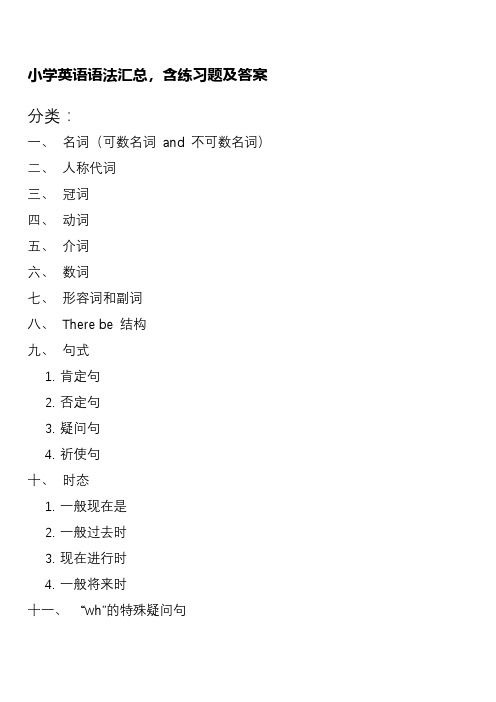
小学英语语法汇总,含练习题及答案分类:一、名词(可数名词and 不可数名词)二、人称代词三、冠词四、动词五、介词六、数词七、形容词和副词八、There be 结构九、句式1.肯定句2.否定句3.疑问句4.祈使句十、时态1.一般现在是2.一般过去时3.现在进行时4.一般将来时十一、“wh”的特殊疑问句一、 名词(表示任何事物的名称)专有名词:1.特定的人、地方、机构等专有名称。
第一个字母通常要大写。
(e.g. Toby 、Shanghai,Bank of China.)2.星期、月份、节日、学科、报刊名称也属于专有名词。
普通名词:1.个体名词----表示某类人或东西中的个体。
如(student 、 desk )2.集体名词----表示若干个体组成的结合体。
如(class 、 family )3.物质名词----表示无法分为个体的物质名词。
如(water 、 rice 、 sand 、 hair )4.抽象名词----表示情感、状态、品质等抽象名词。
如(love 、carelessness )个体名词和集体名词多数可以 用数目来计算,称为可数名词,有单数、复数形式 物质名词和抽象名词通常无法用数目计算,称为不可数名词,一般只有一种形式。
1.由元音字母的变化构成:man-men/ tooth-teeth/ foot-feet/ mouse-mice/ woman-women2.单复数形式一样的名词:sheep / deer / fish (也可以fishes)3.有些名词变成复数时加-en: child-children /ox-oxenPractices:1.peach2.zoo3. glass4.foxdy6. Policewoman7. house8.photo 9. monkey 10. wife11.rose 12. path 13. judge 14.map二、人称代词主格一般用在句子前面,宾格用在动词后面,I am Li Le. Call me le le.形容词性人称代词指“某人的什么”,my book(我的书),your puppy.(你的小狗)名词性人称代词指什么是“某人的”,This book is mime(这本书是我的)Practices:1.He (他)is my brother .2.I had a letter from her(她).3.It’s all right; it’s only me(我)4.Today we (我们)went in our(我们的)car;tomorrow we(我们) are going in theirs(他们的)5.I(我)lend my(我的)books gladly to my(我的)friends and to yours(你的).6.Can you help me (我)with my (我的)English?7.When you(你)go to see your(你的)father, please take these books to him(他)。
小学英语语法讲解及习题

语法第一讲重点:缩写形式;an & a & X 的用法;一般疑问句;否定句;肯定回答/否定回答;单数改为复数Ⅰ. 缩写形式I’m=I am he’s=he is she’s=she is they’re=they areyou’re=you are there’s=there is they’re=they are can’t=can notdon’t=do not doe sn’t=does not isn’t=is not aren’t=are notlet’s=let us won’t=will not I’ll=I will wasn’t=was not总结:通常情况下,'m即am,'s即is(但let’s=let us),'re即are ,n't即not (但can’t=can not)Ⅱ.an & a & X的用法a用在辅音音素前,包括以前元音[j]、[w]开首的词前,读作[E],强调时读作[ei]。
注意,这里讲的辅音音素指的是发音,不是指辅音字母。
an用在元音音素前(不是元音字母),读作[En],强调时读作[An]。
例:a hotel [hEu5tel]一家旅馆a knife [naif] 一把小刀a useful tool [5ju:sful] 一件有用的工具a university [7ju:ni5vE:siti] 一所大学a European country [7juErE5pi(:)En] 一个欧洲国家a one-eyed man ['wQn5aid] 一个一目失明的人an hour [5auE] 一小时an ant [Ant] 一只蚂蚁an honour [5CnE] 一种荣誉an honest boy [5Cnist] 一个诚实的男孩an umbrella [Qm5brelE] 一把伞an onion [5QnjEn] 一个洋葱an eye [ai] 一只眼睛an ear [iE] 一只耳朵an English book [5iN^liF] 一本英语书an egg [e^] 一只鸡蛋an apple [5Apl] 一个苹果an island [5ailEnd] 一座岛an uncle [5QNkl] 一位叔叔an old man [Euld] 一位老人an elephant [5elifEnt] 一头大象a D [di:] 一个D (B、C、G、J、K、P、Q、T、U、V、W、Y、Z前也用a)an F [ef] 一个F(A、E、H、I、L、M、N、O、R、S、X前也用an)Ⅲ.一般疑问句与否定句Be动词的用法口诀:我用am,你用are,is连着他,她,它;单数名词用is,复数名词全用are。
小学英语语法总结及练习

一般现在时
三、改错划出错误的地方,将正确的写在横线上 1.IsyourbrotherspeakEnglish________________________ ________ 2.Doeshelikesgoingfishing__________________________ ________ 3.Helikesplaygamesafterclass._______________________ ______________ 4.Mr.WuteachsusEnglish.___________________________ __________ 5.Shedon’tdoherhomeworkonSundays._______________ ______________________
pass_______guess_______
动词三单的变化规则
二、用括号内动词的适当形式填空, 1.Heoften________havedinnerathome. 2.SuHaiandSuYang_______haveeightless onsthisterm. 3.Thegirl_______teachusEnglishonSunda ys. 4.She_______gotoschoolfromMondaytoFri day.
6.一般现在时
一般现在时的功能 1.表示事物或人物的特征、状态,如:Theskyisblue. 2.表示经常性或习惯性的动作,如:Igetupatsixeveryday. 3.表示客观现实,如:Theearthgoesaroundthesun.
一般现在时的构成 1.be动词:主语+beam,is,are+其它,如:Iamaboy. 2.行为动词:主语+行为动词+其它,如:WestudyEnglish. 3.当主语为第三人称单数he,she,it时,要在动词后加"-s"或"es",如:MarylikesChinese.
小学英语语法最综合的讲解和习题
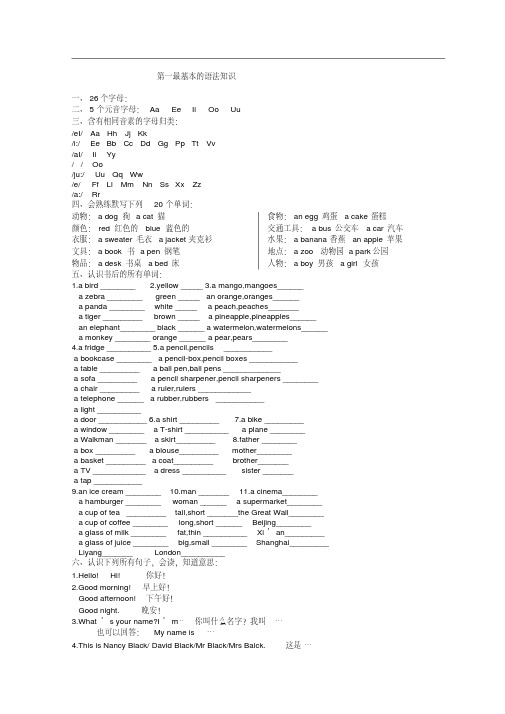
第一最基本的语法知识一、26个字母:二、5个元音字母:Aa Ee Ii Oo Uu三、含有相同音素的字母归类:/eI/ Aa Hh Jj Kk/i:/ Ee Bb Cc Dd Gg Pp Tt Vv/aI/ Ii Yy/ / Oo/ju:/ Uu Qq Ww/e/ Ff Ll Mm Nn Ss Xx Zz/a:/ Rr四、会熟练默写下列20个单词:动物:a dog 狗 a cat 猫颜色:red 红色的blue 蓝色的衣服:a sweater 毛衣 a jacket夹克衫文具:a book 书 a pen 钢笔物品:a desk 书桌 a bed 床食物:an egg 鸡蛋 a cake 蛋糕交通工具: a bus 公交车 a car 汽车水果:a banana 香蕉an apple 苹果地点:a zoo 动物园 a park公园人物:a boy 男孩 a girl 女孩五、认识书后的所有单词:1.a bird ________2.yellow _____3.a mango,mangoes______a zebra ________ green _____ an orange,oranges______a panda ________ white _____ a peach,peaches_______a tiger _________ brown _____ a pineapple,pineapples______an elephant________ black ______ a watermelon,watermelons______a monkey ________ orange ______ a pear,pears________4.a fridge __________5.a pencil,pencils ___________a bookcase ________ a pencil-box,pencil boxes ___________a table _________ a ball pen,ball pens _____________a sofa _________ a pencil sharpener,pencil sharpeners ________a chair _________ a ruler,rulers ____________a telephone ______ a rubber,rubbers ___________a light __________a door ___________ 6.a shirt _________ 7.a bike _________a window ________ a T-shirt __________ a plane ________a Walkman _______ a skirt_________ 8.father ________a box _________ a blouse_________ mother________a basket _________ a coat_________ brother_______a TV ____________ a dress __________ sister _______a tap ___________9.an ice cream ________ 10.man _______ 11.a cinema________a hamburger ________ woman ______ a supermarket________ a cup of tea _________ tall,short _______the Great Wall________ a cup of coffee ________ long,short ______ Beijing________a glass of milk ________ fat,thin __________ Xi’an_________ a glass of juice ________ big,small ________ Shanghai_________ Liyang_______ London__________六、认识下列所有句子,会读,知道意思:1.Hello! Hi! 你好!2.Good morning! 早上好!Good afternoon! 下午好!Good night. 晚安!3.What’s your name?I’m…你叫什么名字?我叫… 也可以回答:My name is … 4.This is Nancy Black/ David Black/Mr Black/Mrs Balck. 这是… (That’s) Helen Brown/Mike Brown/Mr Brown/Mrs Brown 那是… Wang Bing/Liu Tao/Yang Ling /Gao ShanBobby/MimiMiss Li/Mr Green.my father/mother/brother/sistera cat/an apple/...(Mr 先生,Mrs夫人,Miss小姐,在学校Mr称呼男老师,Miss称呼女老师)5.Nice to meet you. 见到你很高兴。
人教版小学英语语法讲解及习题
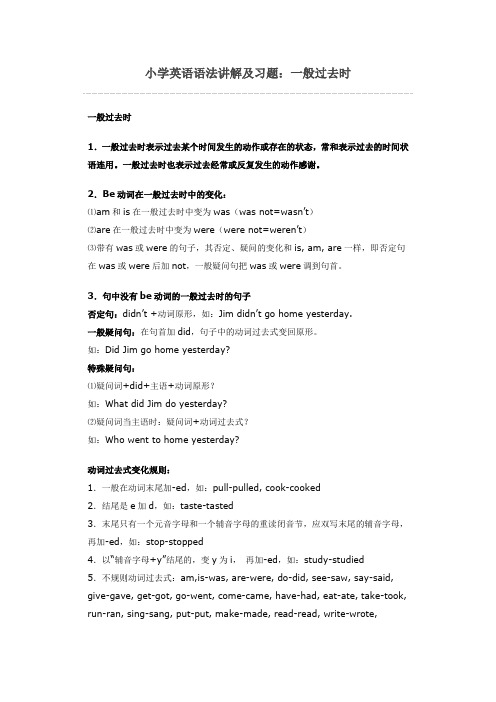
小学英语语法讲解及习题:一般过去时一般过去时1.一般过去时表示过去某个时间发生的动作或存在的状态,常和表示过去的时间状语连用。
一般过去时也表示过去经常或反复发生的动作感谢。
2.Be动词在一般过去时中的变化:⑴am和is在一般过去时中变为was(was not=wasn’t)⑵are在一般过去时中变为were(were not=weren’t)⑶带有was或were的句子,其否定、疑问的变化和is, am, are一样,即否定句在was或were后加not,一般疑问句把was或were调到句首。
3.句中没有be动词的一般过去时的句子否定句:didn’t +动词原形,如:Jim didn’t go home yesterday.一般疑问句:在句首加did,句子中的动词过去式变回原形。
如:Did Jim go home yesterday?特殊疑问句:⑴疑问词+did+主语+动词原形?如:What did Jim do yesterday?⑵疑问词当主语时:疑问词+动词过去式?如:Who went to home yesterday?动词过去式变化规则:1.一般在动词末尾加-ed,如:pull-pulled, cook-cooked2.结尾是e加d,如:taste-tasted3.末尾只有一个元音字母和一个辅音字母的重读闭音节,应双写末尾的辅音字母,再加-ed,如:stop-stopped4.以“辅音字母+y”结尾的,变y为i,再加-ed,如:study-studied5.不规则动词过去式:am,is-was, are-were, do-did, see-saw, say-said, give-gave, get-got, go-went, come-came, have-had, eat-ate, take-took, run-ran, sing-sang, put-put, make-made, read-read, write-wrote,draw-drew, drink-drank, fly-flew, ride-rode, speak-spoke, sweep-swept, swim-swam, sit-sat过去时练习写出下列动词的过去式is\am_______ fly_______ plant_______ are_______drink_______ play_______ go_______ make_______does_______ dance_______ worry________ ask_______taste_______ eat_______ draw________ put_______throw_______ kick_______ pass_______ do_______Be动词的过去时练习(1)一、用be动词的适当形式填空1. I _______ at school just now.2. He ________ at the camp last week.3. We ________ students two years ago.4. They ________ on the farm a moment ago.5. Yang Ling ________ eleven years old last year.6. There ________ an apple on the plate yesterday.7. There ________ some milk in the fridge on Sunday.8. The mobile phone _______ on the sofa yesterday evening.二、句型转换1. It was exciting.否定句:______________________________________________一般疑问句:___________________________________________肯、否定回答:__________________________________________2. All the students were very excited.否定句:______________________________________________一般疑问句:___________________________________________肯、否定回答:__________________________________________3. They were in his pocket.否定句:______________________________________________一般疑问句:___________________________________________肯、否定回答:__________________________________________Be动词的过去时练习(2)一、用be动词的适当形式填空1. I _______ an English teacher now.2. She _______ happy yesterday.3. They _______ glad to see each other last month.4. Helen and Nancy _______ good friends.5. The little dog _______ two years old this year.6. Look, there _______ lots of grapes here.7. There _______ a sign on the chair on Monday..8. Today _______ the second of June. Yesterday _______ the first of June. It _______ Children’s Day. All the students _______ very excited.二、句型转换1. There was a car in front of the house just now.否定句:______________________________________________一般疑问句:___________________________________________肯、否定回答:__________________________________________三、中译英1.我的故事书刚才还在手表旁边。
小学英语语法——形容词与副词知识点讲解+练习

形容词和副词一、形容词、副词概述1、形容词定义:形容词(adjective),简称adj,用来修饰名词或代词,表示人或事物的性质、状态和特征。
2、副词定义:副词(adverb),简称adv,用来修饰动词、形容词或副词,表示时间、频率、范围、语气、程度等。
二、形容词、副词考点纵览三、综合练习( ) 1. How beautifully she sings! I have never heard _____ voice.A. a betterB. a bestC. the betterD. the best ( ) 2. She looks very _____ but I can’t remember her name.A. similarB. familiarC. friendlyD. strange ( ) 3. Children all looked _____ at the broken model plane and felt quite _____.A. sad; sadB. sadly; sadlyC. sad; sadlyD. sadly; sad( ) 4. The child dreamed that he had once lived in a _______ house in the forest.A. wooden pretty littleB. little pretty woodenC. pretty little woodenD. wooden little pretty( ) 5. ---Which team is _______ to win the game?---I don’t know, but I’ve found _______ for ours to win.A. probable; it unlikelyB. likely; it possibleC. possible; it possibleD. likely; it possibly( ) 6. With the development of the Internet, _______ communication is done by regular mail.A. lessB. moreC. littleD. few( ) 7. ---If you don’t like the red coat, take the blue one.---OK, but do you have ______ size in blue? This one’s a bit tight for me.A. a bigB. a biggerC. the bigD. the bigger( ) 8. If there were no examinations, we should have ______ at school.A. the happiest timeB. a more happier timeC. much happiest timeD. a much happier time( ) 9. This dress is prettier, but it costs ______ that one.A. twice more thanB. twice as much asC. as much twice asD. twice so much as( ) 10.________students are required to take part in the boat race.A. Ten strong young ChineseB. Ten Chinese strong youngC. Chinese ten young strongD. Young strong ten Chinese( ) 11. Allen had to call a taxi because the box was ____to carry all the way home.A. much too heavyB. too much heavyC. heavy too muchD. too heavy much( ) 12. Our neighbor has ________ours.A. as a big house asB. as big a house asC. the same big house asD. a house the same big as( ) 13. We were in ________when we left that we forgot the airline tickets.A. a rush so anxiousB. a such anxious rushC. so an anxious rushD. such an anxious rush( ) 14. ---I was riding along the street and all of a sudden, a car cut in and knocked me down.---You can never be ________careful in the street.A. muchB. veryC. soD. too( ) 15. ---You don’t look very ________.Are you ill?---No,I’m just a bit tired.A. goodB. wellC. strongD. healthy( ) 16. Four of Robert’s children were at the party,including ________, Luke.A. the eldestB. an oldest oneC. the oldD. an old one( ) 17. Many students signed up for the ________race in the sports meeting to be held next week.A. 800-metre-longB. 800-metres-longC. 800 metre lengthD. 800 metres length( ) 18. It’s always difficult being in a foreign country,________if you don’t speak the language.A. extremelyB. naturallyC. basicallyD. especially( ) 19. In recent years,travel companies have succeeded in selling us the idea that the further we go,__________.A. our holiday will be betterB. our holiday will be the betterC. the better our holiday will beD. the better will our holiday be( ) 20. When he heard a cry for help, he ran out as ________ as he could.A. hardlyB. quicklyC. finallyD. slowly( ) 21. “Our team is _____ to win the match.” “Really? But I don’t think so.”A. easyB. difficultC. possibleD. sure( ) 22. A ______ road goes ______ from one place to another.A. straight; straightB. straightly; straightlyC. straight; straightlyD. straightly; straight( ) 23. “This book is ______ more useful for us students.” “Yes, but it is _______ too difficult.”A. quite; quiteB. much; ratherC. rather; quite D quite; much( ) 24. There was a ______ change in the weather, and the rain came pouring down.A. quickB. slowC. fastD. sudden( ) 25. You can speak ______ in front of him, but you can’t eat ______ in his restaurant.A. freely; freelyB. free; freelyC. freely; freeD. free; free( ) 26. Tom will not be at the picnic, ______ to the family’s disappointment.A. muchB. moreC. too muchD. much more( ) 27. --- I have seen so little of Mike ______. Is he away on business?--- Oh, no. He just leaves for his office early and comes back very ______.A. later; latelyB. later; laterC. lately; lateD. late; lately( ) 28. From his ______ voice on the phone I know everything is well under way.A. satisfactoryB. satisfyingC. satisfiedD. satisfaction( ) 29. In ______ Chinese culture, marriage decisions were often made by parents for their children.A. traditionalB. historicC. peacefulD. civil( ) 30. The houses in the village are ______ built of wood and hay.A. mostB. almostC. nearlyD. mostly( ) 31. --- What do people wear when they go to the theatre?--- Well, it isn’t very ______. People can wear anything they like.A. normalB. certainC. modernD. simple( ) 32. Mary’s biology is ______ than ______ in the class.A. a lot of better; anyone else’sB. far better; anyone’s else’sC. much better; anyone elseD. a lot better; anyone else’s( ) 33. We decided not to climb the mountains because it was raining ____.A. badlyB. hardlyC. stronglyD. heavily( ) 34. Paris is one of _____ cities in the world.A. more beautifullyB. more beautifulC. the most beautifullyD. the most beautiful ( ) 35. Are you going to leave______?A. the open windowsB. the windows openingC. the windows openD. the windows opened( ) 36. Bob never does his homework _____ Mary, so he makes lots of mistakes.A. so careful asB. as carefully asC. carefully asD. as careful as.( ) 37. My sister is good at sports. She can jump ____ than me.A. highestB. very highC. too highD. much higher ( ) 38. When spring comes, the trees get ____.A. green and greenB. green and greenerC. greener and greenD. greener and greener( ) 39.He works very ___________.He _____________has a rest on Sundays.A. hard; hardlyB. hardly; hardC. hard; hardD. hardly; hardly( ) 40.He learns Russian_____________.A. goodB. niceC. wellD. fine( ) 41.The boy didn’t run______________ to catch the bus.A. fast enoughB. enough fastC. quick enoughD. enough quickly ( ) 42.Eating _____________ is bad for our health.A. much tooB. too muchC. too moreD. too many( ) 43.Have you ever seen ______________ big panda before?A. a suchB. such aC. so aD. as( ) 44.He looks very _____________ today.A. worriedB. worryC. worryingD. to worry( ) 45.Listen to me. I have _____________ to tell you.A. important somethingB. important anythingC. something importantD. anything important( ) 46. ---How ___ can you finish the drawing?--- In ten minutes.A. longB. often.C. soonD. rapid( ) 47. This book is _____ worth seeing again.A. veryB. quiteC. wellD. much( ) 48. My _____ brother is three years ____ than I .A. old; olderB. elder; olderC. older; elderD. old; elder( ) 49. We felt ___ after we watched the ___ football match.A. exciting; excitedB. excited; excitingC. excited; excitedD. exciting; exciting( ) 50. The old man lived ____ in the house, but he didn’t feel___.A. lonely; lonelyB. alone; lonelyC. alone; aloneD. lonely; alone小学英语语法——形容词与副词知识点讲解+练习参考答案1. A2.B3.D4.C5.B6.A7.B8.D9.B 10.A 11. A 12.B 13.D 14.D 15.B 16.A 17.A 18.D 19.C 20.B 21. D 22.A 23.B 24.D 25.C 26.A 27.C 28.C 29.A 30.D 31. B 32.D 33.D 34.D 35.C 36.B 37.D 38.D 39.A 40.C 41. A 42.B 43.B 44.A 45.C 46.C 47.C 48.B 49.B 50.B11。
小学英语语法--冠词语法精细讲解及对应练习题
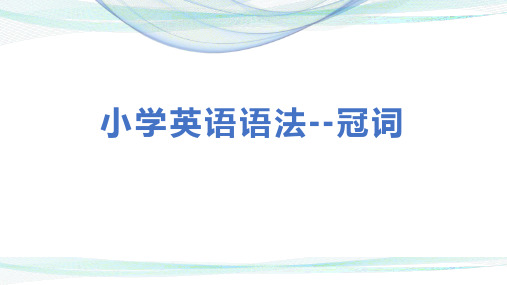
A.a
B.an
C. the
D./
5 . To n y h a s _ ___ egg a n d s o m e ve g e t a b le s f o r b r e a kfast.
A.a
B.an
C.some
D.any
冠词习题练一练
6. I have____French stamp. The stamp is beautiful.
at school 上学 at table 在吃饭 in bed (睡、病、躺)在床上 in hospital 住院 by sea 乘船 in front of 在……前面(外部) on earth 究竟
冠词习题练一练
一、填写适当的冠词 _____ball _____book _____apple _____story _____Earth ______egg _____chair _____sun _____pear _____onion 二、用适当的冠词填空 1.___sun is very hot. 2. Can I have ___ apple? 3. Do you want to eat ___ egg? 4. I want to buy ___ new car. 5. Mommy likes to read ___ story. 6. I have ___ blue ball. 7. He broke ___ chair. 8. She reads ___ book in class. 9. I have ___ apple and ___ pear for lunch.
冠词习题练一练 三.圈出正确的冠词 1. Sue had to hurry to catch the / an bus. 2. Clive and Julian played guitar in a / an band. 3. Petey buried an / a bone in Nana's backyard. 4. My school won the / an first place prize for selling candles! 5. I want to ride my bike to the / a friend's house. 6. The / An new computer we bought has iTunes on it. 7. My sneakers have a / an orange stripe on the side. 8. Legos are fun to play with the / a friend or two. 9. We watched a TV show being filmed in a / the town. 10. I watched as mom put the Cream-of-Wheat into a / an pot.
(完整版)小学英语语法及习题

小学英语语法及习题一、名词复数规则1.一般情况下,直接加-s,如:book-books, bag-bags, cat-cats, bed-beds2.以s. x. sh. ch结尾,加-es,如:bus-buses, box-boxes, brush-brushes, watch-watches3.以“辅音字母+y”结尾,变y为i, 再加-es,如:family-families, strawberry-strawberries4.以“f或fe”结尾,变f或fe为v, 再加-es,如:knife-knives5.不规则名词复数:man-men, woman-women, policeman-policemen, policewoman-policewomen, mouse-micechild-childrenfoot-feet,.tooth-teethfish-fish, people-people, Chinese-Chinese, Japanese-Japanese写出下列各词的复数I _________him _________this ___________her______watch _______child _______photo ________diary ______day________ foot________ book_______ dress________tooth_______ sheep ______box_______ strawberry _____thief _______yo-yo ______ peach______ sandwich ______man______ woman_______paper_______ juice___________ water________ milk________ rice__________tea__________二、一般现在时一般现在时基本用法介绍【No. 1】一般现在时的功能1.表示事物或人物的特征、状态。
小学英语语法总复习(带练习题)

当主语为第三人称(dì sān rén chēnɡ)单数(he, she, it)
时,要在动词后加“-s”或“-es” 如:Mary likes Chinese.玛丽喜欢汉语。
第六页,共四十八页。
一般现在时的变化(biànhuà)
❖2. I do my homework every day.(改为一般疑问 句,作否定回答)
______________________________________
❖3. She likes milk.(改为一般疑问句,作肯定回答)
____________________________________
2、现在进行时的肯定句基本结构为be 加动词ing.
3、现在进行时的否定句在be后加not。
4、现在进行时的一般疑问句把be动词调到句首。
5、现在进行时的特殊疑问(yíwèn)的基本结构为: 疑问词+be动词+主语+doing+其它? 但疑问词当主语时其结构为: 疑问词+be动词+doing+其它?
2. Listen!Some girls _____( sing) in the classroom . 3. My mother ________( cook )some nice
food now.
4. What _____ you ______ ( do ) now?
5. Look!They __________( have) an English lesson .
7. The girl _______(teach) us English on
小学英语语法练习题及答案

小学英语语法练习题及答案小学英语语法练习题及答案【篇一:小学英语语法及练习题--名词】定义名词可以分为专有名词和普通名词,专有名词是某个(些)人,地方,机构等专有的名称,如beijing,china等。
普通名词是一类人或东西或是一个抽象概念的名词,如:book,sadness等。
普通名词又可分为下面四类:1)个体名词:表示某类人或东西中的个体,如:gun。
2)集体名词:表示若干个个体组成的集合体,如:family。
4)抽象名词:表示动作、状态、品质、感情等抽象概念,如:work。
个体名词和集体名词可以用数目来计算,称为可数名词,物质名词和抽象名词一般无法用数目计算,称为不可数名词。
2. 名词复数的规则变化(情况,构成方法,读音,例词)a. 一般情况在名词后加-s清辅音后读/s/map-maps浊辅音和元音后读 /z/bag-bags /car-carsb. 以s, sh, ch, x等结尾的名词加-es读 /iz/bus-buses/ watch-watches/brush-brushes/box-boxesc. 以ce, se, ze,等结尾加 -s读 /iz/license-licensesd. 以辅音字母+y结尾的名词把变y 为i再加es读 /z/baby---babiese. 以o 结尾的名词,变复数时:1). 加s,如: photo---photos piano---pianosradio---radioszoo---zoos;2). 加es,如:potato--potatoes tomato--tomatoes3). 上述a和b两种方法均可,如zero---zeros / zeroes。
f. 以f或fe 结尾的名词变复数时:1). 加s,如: belief---beliefsroof---roofssafe---safes gulf---gulfs2). 去f, fe 加ves,如:half---halvesknife---knives leaf---leaves wolf---wolveswife---wives life---lives thief---thieves3). 上述a和b两种方法均可,如handkerchief: handkerchiefs / handkerchieves。
小学英语语法专项练习-动词讲解及练习题

小学英语语法专项练习-动词讲解及练习题一、动词的概念动词是表示人、事物的动作、状态或存在的词,是英语句子中最核心的部分。
二、动词的分类1. 及物动词:需要加宾语才能构成句子的动词,例如:write、eat等。
2. 不及物动词:不需要加宾语也可以构成句子的动词,例如:laugh、sit等。
3. 助动词:辅助主要动词构成各种时态、语态和否定式,例如:be、do等。
三、动词时态动词时态表示动作发生的时间,常用的动词时态有以下几种:1. 一般现在时:表示现在正在发生的事情或经常性的动作。
2. 一般过去时:表示过去发生的动作或状态。
3. 一般将来时:表示将要发生的动作或状态。
4. 现在进行时:表示现在正在进行的动作或状态。
5. 过去进行时:表示过去某个时刻正在进行的动作或状态。
6. 将来进行时:表示将来某个时刻正在进行的动作或状态。
四、动词的练题1. 用所给动词的正确形式填空:1) He often ____(play) football with his friends after school.2) My father ____(be) a doctor when he was young.3) They ____(visit) the museum tomorrow morning.4) She ____(watch) TV now.2. 根据括号内的提示写出动词正确的形式:1) He usually ____(drink) milk in the morning. (一般现在时)2) We ____(cook) dinner at six o'clock last night. (一般过去时)3) Tomorrow we ____(go) to the park to have a picnic. (一般将来时)4) Look! The boy ____(swim) in the river. (现在进行时)以上是小学英语语法专项练习-动词讲解及练习题,希望有所帮助!。
小学英语语法专项练习-名词讲解及练习题
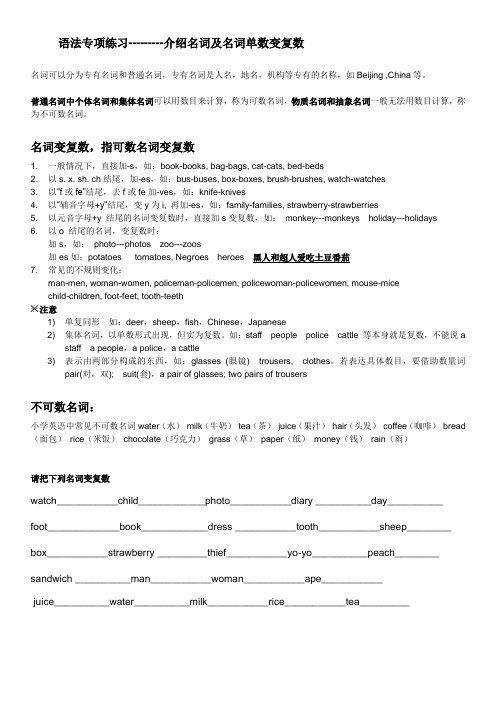
语法专项练习---------介绍名词及名词单数变复数名词可以分为专有名词和普通名词,专有名词是人名,地名,机构等专有的名称,如Beijing ,China等。
普通名词中个体名词和集体名词可以用数目来计算,称为可数名词,物质名词和抽象名词一般无法用数目计算,称为不可数名词。
名词变复数,指可数名词变复数1. 一般情况下,直接加-s,如:book-books, bag-bags, cat-cats, bed-beds2. 以s. x. sh. ch结尾,加-es,如:bus-buses, box-boxes, brush-brushes, watch-watches3. 以“f或fe”结尾,去f或fe加-ves,如:knife-knives4. 以“辅音字母+y”结尾,变y为i, 再加-es,如:family-families, strawberry-strawberries5. 以元音字母+y 结尾的名词变复数时,直接加s变复数,如:monkey---monkeys holiday---holidays6. 以o 结尾的名词,变复数时:加s,如:photo---photos zoo---zoos加es如:potatoes tomatoes, Negroes heroes 黑人和超人爱吃土豆番茄7. 常见的不规则变化:man-men, woman-women, policeman-policemen, policewoman-policewomen, mouse-micechild-children, foot-feet, tooth-teeth※注意1) 单复同形如:deer,sheep,fish,Chinese,Japanese2) 集体名词,以单数形式出现,但实为复数。
如:staff people police cattle 等本身就是复数,不能说astaff a people,a police,a cattle3) 表示由两部分构成的东西,如:glasses (眼镜)trousers,clothes。
- 1、下载文档前请自行甄别文档内容的完整性,平台不提供额外的编辑、内容补充、找答案等附加服务。
- 2、"仅部分预览"的文档,不可在线预览部分如存在完整性等问题,可反馈申请退款(可完整预览的文档不适用该条件!)。
- 3、如文档侵犯您的权益,请联系客服反馈,我们会尽快为您处理(人工客服工作时间:9:00-18:30)。
小学英语语法分类练习题判断对错:1.This not is an apple. ( )2.改正:3.This’s a cat.( )4.改正:5.This isn’t a ball. ( )6.改正:7.That’s isn’t a girl. ( )8.改正:9.Its a cup. ( )10.改正:11.That’s an pear. ( )12.改正:13.It’is a cake. ( )14.改正:15.It’s a car. ( )16.改正:17.Thatis a candle. ( )18.改正:19.10. Ice-cream are cold. ( ) 改正: 11. Are you a teacher. ( )改正:20.Is she miss Li ? ( )改正:21.He is a boys. ( )改正:22.Is they a book?( )改正:23.Are you Bob? Yes, you are. ( ) 改正:_________________________ 14. That is a egg. ( )改正:15. That’s a Bob改正:16. This Betty. ( )改正:17. It’s isn’t a doll. ( )改正:18. I’s Mingming. ( )改正:19. I am not a girl. ( )改正:20. This isn’t Lingling.( )改正:21. You are Bob and Betty.( ) 改正:22. This is Liu Miss.( )改正:23. This is Mr Li.( )改正:24. This is mingming.( )改正:25. It’s are a egg.( )改正:26. I’m a chinese.( )改正:27. I amn’t Bob.( )改正:28. He is an apple.( )改正:29. She is a boy.( )改正:30. This isn’t a desk.( )改正:31. That’s you cat.改正:32. Are your sister Ling-ling ? 改正:33.Is Bob five ? Yes, he’s.改正:变复数句:1.I’m a pupil.2.You are not a teacher.3.He’s a teacher.4.It’s a chick.5.She is a girl.6.This is a candle.7.That’s a house.8.It is not a picture.9.She isn’t a worker.10.That isn’t a flag. 变单数句:1.We are pupils.2.You are teachers.3.They are clocks.4.They are boys.5.They are girls.6.Those are not jars.7.These are pigs.8.We are workers.9.Those are cakes.10.These are hands.1. I’m a pupil. (否定句)2. You are not a teacher. (肯定句)3. He’s a teacher. (否定句)4. It’s a chick. (否定句)5. She is a girl. (否定句)6. This is a candle. (否定句)7. That’s a house. (否定句)8. It is not a picture. (肯定句)9. She isn’t a worker. (肯定句)10. That isn’t a flag. (肯定句)11.We are pupils. (否定句) 12.Are you teachers? (否定句)13.Are they clocks? (否定句)14.Are they boys? (肯定句)15.Is she a teacher? (否定句)16.Is it a car? (否定句)17.Is that an apple? (肯定句)18.We are workers.19.Are those cakes?(肯定句)20.Are these hands? (否定句)21.Is it an apple?(否定句)22.Is it an apple?(肯定句)连词成句:1. egg, this, not, is, an;-------------------------------------------------------------- 2. you, Betty, are, Bob, and;-------------------------------------------------------------- 3. I, not, am, girl, a;-------------------------------------------------------------- 4. she, Miss, is,Li;-------------------------------------------------------------- 5. candle, that, not, is, a;-------------------------------------------------------------- 6. are, a, and, we, boys, girls;-------------------------------------------------------------- 7.is, a, gun, it;-------------------------------------------------------------- 8.this, not, is, a, glove;-------------------------------------------------------------- 9.are, a, and, ball, a, desk, they;-------------------------------------------------------------- 10.am, a, I, girl;--------------------------------------------------------------填is,am,are1.Ice-cream _______ cold.2.They _______ not teachers.3.We _______ pupils.4.I_______ a boy.5.You _______ a girl.6.This _______ a book.7.Those _______ not jackets.8.She _______ Miss Li.9.He_______ not a teacher.10.They_______ are pupils.11.They _______ are dogs.12.I _______ a girl.13.You _______ Bob and Betty.14.These _______ flags.15.Those _______ pictures.16.That_______ not a candle.17.I _______ Betty.18.He _______ my teacher.19.She _______ our teacher.20.They _______ cakes.21._______ I right ?22._______ he a teacher ?23._______ our pupils Chinese ?24.He with his friends _______ pupil.25.He and she _______ pupils.26.My teachers _______ good.27.Our teachers _______ good.28.His milk _______ cold.29._______ your mother 30?30._______ I wrong ?31.Her mother and father _______ Chinese.32._______ your Mum a teacher?33.Bob and David’s father _______ Mr. Wang.34.Those men _______ my workers.35.Who_______ Englishmen?36.Who _______ English?37.Who _______ I ?38.These men _______ Chinese.39.What_______ you doing ?变一般疑问句, 肯定/否定回答。
1.This is my hen.2.——————————3.——————————4.——————————5.You are Bob and David.6.——————————7.——————————8.——————————9.He’s David.10.——————————11.——————————12.——————————13.She’s Ling-ling.14.——————————15.——————————16.——————————17.They are teachers.18.——————————19.——————————20.——————————21.22.Bob’s fine.23.——————————24.——————————25.——————————26.7. This boy is five. ——————————————————————————————8. Ling-ling’s Chinese. ——————————————————————————————9. Bob and David are pupils. ——————————————————————————————10. There is a bird in the tree. ——————————————————————————————对划线部分提问:1.This is my bag.2.That’s an egg.3.It’s our car.4.They are fish.5.His name’s Bob.6.Our names are Bob and Betty.7.Its name’s Wangwang.8.We’re Bob and Betty.9.This is Bob.10. That is David.1.That’s Betty.2.His name’s David.3.This is Betty’s kite.4.Bob’s and David’s_________(tomato) are nice.5.What’s that?6. It’s a potato. (复数句)7.What’re they?8. They’re glass.(单数句)9.They’re not elephants. (单数句)10.They’re not my elephants. (单数句)11.Bob and David’s _________(father) is Mr. Wang.12.They are not Bob’s elephants. (单数句)1.That girl is Betty.2.Her name’s Betty.3.These women are Chinese. (单数句)4.Is this a man?(复数句)5.She’s my aunt.6.He is my uncle.7.We are Englishmen.8.They are English.9.Bob’s _______(friend) are David and Betty.10.We are English.11.1.I am Bob.2.These girls are pupils.3.Their names are Bob and David.4.She’s ________________(Bob 和 Lucy 的) mother.5.Bob’s and Lucy’s___________(teacher) are Mr. Wang and Miss Li.6.He’s a postman.(复数句)7.These men are workers. (单数句)8.These men are my workers. (单数句)9.Ming-ming is Chinese.10.Ming-ming and Ling-ling are Chinese.11.Bob and Betty are pupils.1.We have books.2.red, that, flag, is (连词成句)3.red, those, flags, are (连词成句)4.It’s an egg.5.Is this an orange car? (复数句)6.Are they red flags ? (单数句)7.Our teacher_______ (have/has) got a car.8._______ (have/has) her friends got a kite?9.We have got two books.10.It has got a long nose.11.They have got a pig.12.They have got a pig.1.I’ve got a ball. (否定)2.I’ve got a ball.3.They have got books. (一般疑问句)4.We have flowers.5.Their names are Bob and David.6.They’re Bob and David.7.They are Bob and David.8.That boy is ten.9.These girls are English.10.Our teacher __________(have/has) got a bag.11.__________(Has/Have) her mother and father got a car?1.This TV’s big. (同义句)2.Ming-ming has a bag.3.Ming-ming’s got a bag.4.These’re long pencils. (同义句)5.They have three dogs.6.They’ve got three dogs.7.This is _____(a/an) red apple, and that’s_____(a/an) orange box.8.Her friend ________(有) a big ball.9.Bob’s mother and father ________(有) a car.10.1.He’s eating an apple.2.He’s eating an apple.3.He is eating an apple.4.Look, two boys ______________(swim).5.Listen, a baby ______________(cry).6.Bob: How do you do ?7. Betty: ___________________?8.Nice to meet you, Bob.9. _______________________, Betty.10.She has got a car.11.We have got two books.12.I am dancing. (一般疑问句)用所给词的正确形式填空:1.Look, two boys ___________(sit) on the chairs.2.Listen, a baby ___________(cry).e on, the bus___________ (come).4.Where are the children? They _________(play) football.5.My brother’s reading.6.My brother is reading.7.They are sleeping.8.Is he running ? (否定句)9.Is your father drawing ? (否定回答)10.They’re ___________(lie) in the sun.11.He’s eating an apple.12.He’s eating an apple.13.They like swimming.1.My mum’s cooking.2.Are Bob and Betty dancing ? (否定回答)3.Our teacher’s fine.4.How _______ (be) your friend ?5.What’s he doing? He’s running. (复数句)6.Are these women dancing ? (否定句)7.It has got a long nose.8.Where ______ (be) his brothers ? They ________________(stand).9.We are playing football.10.They have got an apple.11.1.Sit down, please. (否定句)2.Don’t close the window. (肯定句)3.Please come here. (否定句)4.Let’s ________ (swim).5.Let her ________ (not dance).6.My sister’s reading in the room.7.We have got a car. (否定句)8.___________ (not late) !一. 填“是”(am, is, are)1. Our teacher Miss Li.2. Who I ?3. his books here ?4. You Bob.二.填a或an1. old man2. orange bike3. red apple4. new car三. 改错1. That’s you cat .2. Are your sister Ling-ling ?3. This’s a pear .4. Is Bob five ? Yes , he’s .四. 选词填空( I . we .you .he .she .it . they )1. Is this a pen ? Yes , is .2. Are those glasses ? No , aren’t .3. Is your mother a teacher ? Yes, is .4. Who are ? am Bob.5. Are you and David ten ? No, aren’t .6. Is her father Mr. Wang ? Yes, is.五. 句型转换1. It’s a ball .(对划线部分提问)2. Her name’s Fang-fang .(同上)3. This girl’s Fang-fang . (同上)4. They have got two dogs .(否定句)5 . My brother’s two .(一般疑问句)6. What’s that ? It’s an egg .(复数句)7. Are these fish ?(否定回答)8. Are they pens ? Yes, they are .(单数句)9. It hasn’t got a kite .(肯定句)9.现在进行时测试卷一.用所给词的正确形式填空1 Look, these boys ______(run).2 Come on ! The bus _____(come).3 Listen, who _______(sing)?4 Is your friend _____(sit)? No, she _____(swim).5 Oh, my birds are ______(die)!6 I _______(not write)now .二.句型转换1 This girl is washing .(对划线部分提问)2 Our teacher’s eating a pear .(对划线部分提问)3 Are those girls dancing ?(否定句)4 Is Jimmy laughing ?(否定回答)5 My friends are playing .(一般疑问句)6 Is that pig sleeping ? (肯定回答)7 we not reading , we are do homework .(改错) 祈使句测试卷一.变否定祈使句:1. Please sit down .2. Do it like this .3. Fang-fang , come in .4. Go out .二.变肯定祈使句:1. Don’t read the book .2. Let them not dance .3. Don’t let Betty sing .4. Don’t be quick .三. 用所给词的正确形式填空:1. David,_______(not late ) for school.2. _______( quiet ), please .3.________(not laugh ) at me .4. ________(is) a good boy .四.对划线部分提问:1. My car’s blue .2. My car’s blue .3. Our names are Jingjing and Jimmy .4. Those’re Tom’s fish.5. The girl’s Jane.。
